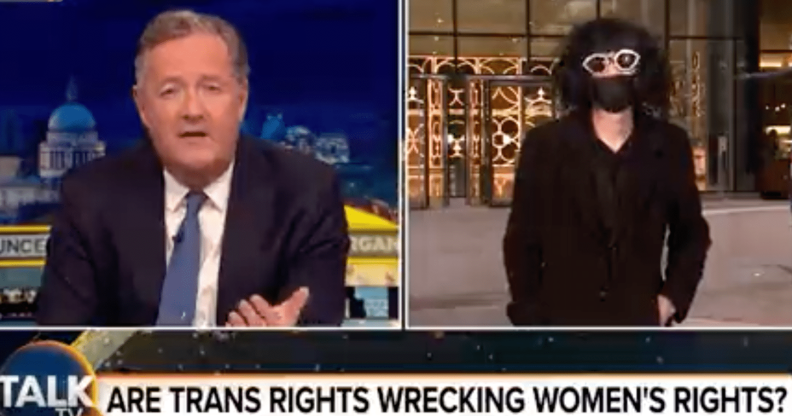UK ‘not as vitriolic’ on trans rights as the media would have you believe, polling reveals

Piers Morgan debating trans lives on TV. (TalkTV)
Britain isn’t as divided over transgender people’s rights as you might think, according to research published on Thursday (June 16).
The More In Common initiative, founded in the wake of MP Jo Cox’s murder, asked 5,000 Brits for their opinions on various gender identity-related questions, including whether they believe trans people are valid in the gender they express.
“Why is More Common interested in this discussion?” the think-tank’s UK director Luke Tryl wrote in a Twitter thread announcing the results.
“Because we don’t think the current debate is serving anyone well and a conversation dominated by extremes risks leaving people feeling fearful, alienated, isolated, and resentful.”
While the UK’s media has become consumed by reporting that frames trans people’s lives as a matter for urgent debate, the research reveals that the majority of Brits don’t consider “the debate about trans people” the be the most important topic.
In fact, it was listed bottom of a list of issues facing the public right now.
Only two per cent said they consider it the top issue for the UK. Comparatively, the cost of living crisis dominated the polling, with 64 per cent agreeing that it’s the most important issue facing the UK right now, more than the next two issues on the list – supporting the NHS and the war in Ukraine – combined.
Most people are comfortable calling people by the pronouns they want to be called by (though some didn’t want to display their own). Some were worried about being shouted at for making mistakes/using the wrong pronouns and wanted more space to understand the language. (5/n) pic.twitter.com/8Cn4tyJBqn
— Luke Tryl (@LukeTryl) June 16, 2022
The research suggests that most Brits respect trans people
When asked whether they believed trans people’s respective genders are valid, 46 per cent said yes. While that’s not a majority, it does outweigh the 32 per cent that disagreed, leaving a space for the 22 per cent who were unsure.
Support for trans people varied among ideological groups. Seventy-one per cent of those who identified as “progressive activists” agreed trans people are valid – comparatively, “disengaged traditionalists” were the top political group to deny trans people, at 45 per cent.
The research highlighted concerns around trans women in sports across generations and ideological groups.
Fifty-seven per cent of respondents said trans women should be barred from participating in women-only sporting events. Gen Z, Millennial and “progressive activists” had the highest support for trans inclusion in sports, but only the latter showed more support than opposition.
Tryl said this opposition isn’t about “definitional concerns ‘whether someone can call themselves a woman or not'”, but about a so-called “level playing field”.
As one participant said: “When it comes to sport, I find it difficult to know who has the right answer.
“When I hear about it on the radio or whatever, I often ask myself ‘Oh, what do I think about that,’ and I think it’s a really difficult topic,” the participant continued.
According to another figure, 33 per cent of people believe that school children should learn that “some people are transgender” during secondary school, while 12 per cent believe it shouldn’t be discussed with children at all.
The public want schools to be safe spaces that support pupils who might be questioning their gender identity. The public want schools to talk about trans people and the teachers we spoke to told us how they tried to make trans pupils feel comfortable. (9/n) pic.twitter.com/Xv7mfMMbND
— Luke Tryl (@LukeTryl) June 16, 2022
The polling comes as a relief to Tryl, who told PinkNews that he hopes “commentators and policymakers will listen to what Britons actually think about these issues.”
“It was so reassuring to find that the way the public talk about trans and gender identity is so far removed from the vitriol we see online,” he said.
“Instead, the public more than anything else start from a position of kindness and accommodation.
“That includes – for most – calling people by the pronouns they want to be called by, and ensuring that schools talk about trans people.”
Tryl added: “Even when the public has concerns such as on sport, they start from a position of finding solutions.”
When it comes to single sex spaces, most distinguish between people who have and haven’t been through gender reassignment surgery. Many are happy/indifferent about the introduction of more unisex toilets in the workplace, but are less comfortable with them in schools. (11/n) pic.twitter.com/YW9uhfCd3v
— Luke Tryl (@LukeTryl) June 16, 2022
Not all people in the trans community were necessarily thrilled by the results.
Popular Twitter activist Katy Montgomerie commented on the thread expressing her disappointment with the questions asked.
“This is good and all, but asking people these questions does encourage people to debate our lives – something which doesn’t affect them,” she said. “Maybe you could ask a load of questions about how accepted transphobic people are next time.”
There was, inevitably, an immediate gender-critical backlash, with some claiming that certain demographics “have not been able to give [their] opinions”.
“Did anyone ask them if they know what a woman is?” said one user in a manner so typical you could have crossed it from a bingo card.
However the majority of comments on the thread expressed an appreciation for the polling, without giving any personal opinions.

